It’s tricky for young people.
We get passionate about something—a business problem, or a cause—and we want to do something about it. But then we’re met with a response along the lines of, “Yeah, right. What do you know?”
Working around this raincloud of underestimation can be tough, especially because young people often need the help (or even just mentorship) of people who are older than us.
I can’t stress this enough: self-awareness, networking, and hard, relentless work.
That’s why you’ve got to meet Bianca Lopes. She’s the twenty-seven year old Chief Identity Officer at BioConnect, an emerging top tech startup in Toronto. Meaning: she partially owns the company and is second-in-command to BioConnect’s CEO.
By age twenty-five, Lopes has also already started and sold a successful painting business and software company. She hadn’t ever actually studied the trades or technology in school, and she was really young when starting both these businesses. Nothing stopped her, though.
With the amount Bianca’s accomplished already, I won’t bat an eye if I see her name in a Forbes Top 30 Under 30 list one of these days.
Here’s exactly how Bianca overcame the age issue and set herself up for winning the #careergoals game.

This Q&A has been edited for clarity and length.
Lesson 1: Spin disadvantages in your favour.
Why did you start your first business?
My parents couldn’t pay for my board and tuition in university. It was $35,000 a year [international student fare] and my home currency at the time was a quarter of the Canadian dollar.
Running a business was the only way I could see myself making the money I needed to make. I remember saying, “Just sign me up.”
I was too young to waitress, so I could only get jobs in bakeries. It just wasn’t cutting it. (I remember making $8.95/hour working at a bakery at UBC…)
I remember going to a career fair and looking around, trying to find a job that made sense for me. There, I saw this booth about running your own business and making money.
[For context: College Pro was running the booth. They run an entrepreneurship program in which they teach students how to run a company by turning those students into franchisees of their painting and window cleaning business.]
I remember asking the guy standing up there, “How much did the best person make?”
He was like, “$50,000”.
Running a business was the only way I could see myself making the money I needed to make. I remember saying, “Just sign me up.”
What was the hardest part of running it?
I went into it out of necessity, and didn’t realize the hustle that it actually took to make something meaningful happen. And it doesn’t happen overnight. I remember in Vancouver, cold calling and going door-to-door [selling the painting services] on rainy days, and evenings. And showing up on a job site and having everyone quit on me. These things just happen.
The second hardest part was being a young woman at the time. (The trades and business are notoriously dominated by guys.)
I could have easily said, “Oh, this isn’t for me.” But I found my niche.
So, imagine me, scrawny, knocking on someone’s door and saying, “Hi, I’m going to paint your twenty-million dollar home.”
They’d look at me and be thinking, “Are you kidding me? You can’t hold a paint brush, or a ladder. You can’t do anything.”
How did you get around that?
I could have easily said, “Oh, this isn’t for me.” But I found my niche.
My sales angle became about the fact that I had taken a colour consulting diploma, and had an eye for design. So maybe showing up looking cool, and not in steel toe boots made their confidence and perception of me change.
Understanding my disadvantage to that industry is where I found strength.
And I and realized my target population. About 70% of the doors that I knocked on, it was actually housewives that did the [job] estimate with me. So, I could build a bond.
I realized, “This is who I am. I am a girl. I’m not typically what you’d imagine to be a tradesperson, but I actually have all these advantages, and I can manage a team, and I’m organized.”
Understanding my disadvantage to that industry is where I found strength. Being self-aware through the hard days, and daily journaling was what made me come up with the solutions. This is the step everyone usually skips.

Lesson 2: Know what you suck at, then ask for help.
Your LinkedIn profile says you sold that business after a few years of running it, and started another one. But this time it was a tech business…?
My mother didn’t come from money, so she would go—and my parents are immigrants—to five different grocery stores [shopping for the lowest price], and not understand the opportunity cost of driving to five grocery stores.
I thought, theres got to be a more efficient fashion to tell my mom the opportunity cost of her driving and say, “This is the total value of your bill.”
So, I used behavioural science to map out mathematically how I was gonna predict where she should go.
[For context: the map became a software company called Basket Wise, which was on one end a tool people could use to map out the best route for grocery shopping, and on another end was a way for grocery retailers to inform customers of their prices.]
You never actually studied tech or software development. How much did you know about the technology part of Basket Wise when you started it?
Nothing. I knew nothing about technology, other than being an average user of apps. I just had a ridiculous curiosity and started a software business from the approach of solving a people-problem. Technology was just the vehicle to solve that problem.
I think there’s so much pressure on young people, especially in technology. They think they have to know it all.
Did that worry you, not knowing a big part of your business?
Oh, it worried the crap out of me every day.
I think there’s so much pressure on young people, especially in technology. They think they have to know it all. Entrepreneurs especially, because they have inherently big egos. They have to have the ego to really believe they can do it.
But, what needs to happen between that belief and actually making it happen is the self-awareness to realize what you don’t know. And then have the humility and brilliance to find people smarter than you and say, “I don’t know this, can you help me?”
Is that actually what you did?
That is literally how I started and how I still live today. I would look at people who I strongly admire, who I could find in my network, and would say, “You seem super interesting, or you seem to know a lot about this one thing, can I buy you coffee?”
Lesson 3: Show people you’re dead-serious.
And people were always on board with helping you?
Uhhh… There’s different degrees of where people are going to help you. It’s not an easy path of snap, snap, snap, here you go.
For example?
It’s difficult for people to take you seriously in the beginning. You’re saying you’re going to disrupt an industry that’s been here for so many years, and they’re looking at you going, “Yeah, right.”
You can’t age in two minutes, but you can perhaps learn a ton in two minutes that can make you sound eloquent.
What do you do about that?
Know your stuff and come prepared, it’s extremely important.
I sometimes hold office hours to help young entrepreneurs, and sometimes they come with just, “I wanna work in strategy.” I’m thinking, “Do you even know what that means?”
Actually hustling day in and day out, you start earning your stripes.
Coming prepared buys you credibility. You can’t age in two minutes, but you can perhaps learn a ton in two minutes that can make you sound eloquent.
And then, follow through. A lot of people will say, “I want to run a big business, I wanna have a tech firm, I wanna do this.” But actually hustling day in and day out, you start earning your stripes.
If you go back to that mentor who kind of ignored you, or kind of laughed at you (which I often do) and say, “Hey, can I have five or ten minutes of your time? I really value the advice you gave me last time and I want to update you on how that advice has been so meaningful to progress me.”
It’s funny, because if we’re the dreamers, why am I the one not sleeping [to work for this]?
The minute that happens, you have shared to them that, “First, I listened to what you said. I took it seriously. I did something about it. And here’s where I’m at.”
That person is ten thousand times more inclined to listen to you and you’re probably gonna earn a brownie point or two by doing that.
Someone said this to me one day: “You guys [at BioConnect] are a bunch of dreamers.” And I said, “It’s funny, because if we’re the dreamers, why am I the one not sleeping [to work for this]?”
I can’t stress this enough: self-awareness, networking, and hard, relentless work.
*Opinions expressed are those of the author, and not necessarily those of Student Life Network or their partners.

 Sponsored
Sponsored


